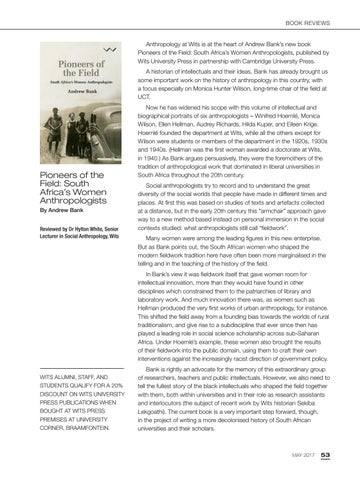BOOK REVIEWS
Anthropology at Wits is at the heart of Andrew Bank’s new book Pioneers of the Field: South Africa’s Women Anthropologists, published by Wits University Press in partnership with Cambridge University Press. A historian of intellectuals and their ideas, Bank has already brought us some important work on the history of anthropology in this country, with a focus especially on Monica Hunter Wilson, long-time chair of the field at UCT.
Pioneers of the Field: South Africa’s Women Anthropologists By Andrew Bank Reviewed by Dr Hylton White, Senior Lecturer in Social Anthropology, Wits
Now he has widened his scope with this volume of intellectual and biographical portraits of six anthropologists – Winifred Hoernlé, Monica Wilson, Ellen Hellman, Audrey Richards, Hilda Kuper, and Eileen Krige. Hoernlé founded the department at Wits, while all the others except for Wilson were students or members of the department in the 1920s, 1930s and 1940s. (Hellman was the first woman awarded a doctorate at Wits, in 1940.) As Bank argues persuasively, they were the foremothers of the tradition of anthropological work that dominated in liberal universities in South Africa throughout the 20th century. Social anthropologists try to record and to understand the great diversity of the social worlds that people have made in different times and places. At first this was based on studies of texts and artefacts collected at a distance, but in the early 20th century this “armchair” approach gave way to a new method based instead on personal immersion in the social contexts studied: what anthropologists still call “fieldwork”. Many women were among the leading figures in this new enterprise. But as Bank points out, the South African women who shaped the modern fieldwork tradition here have often been more marginalised in the telling and in the teaching of the history of the field. In Bank’s view it was fieldwork itself that gave women room for intellectual innovation, more than they would have found in other disciplines which constrained them to the patriarchies of library and laboratory work. And much innovation there was, as women such as Hellman produced the very first works of urban anthropology, for instance. This shifted the field away from a founding bias towards the worlds of rural traditionalism, and give rise to a subdiscipline that ever since then has played a leading role in social science scholarship across sub-Saharan Africa. Under Hoernlé’s example, these women also brought the results of their fieldwork into the public domain, using them to craft their own interventions against the increasingly racist direction of government policy.
WITS ALUMNI, STAFF, AND STUDENTS QUALIFY FOR A 20% DISCOUNT ON WITS UNIVERSITY PRESS PUBLICATIONS WHEN BOUGHT AT WITS PRESS PREMISES AT UNIVERSITY CORNER, BRAAMFONTEIN.
Bank is rightly an advocate for the memory of this extraordinary group of researchers, teachers and public intellectuals. However, we also need to tell the fullest story of the black intellectuals who shaped the field together with them, both within universities and in their role as research assistants and interlocutors (the subject of recent work by Wits historian Sekiba Lekgoathi). The current book is a very important step forward, though, in the project of writing a more decolonised history of South African universities and their scholars.
MAY 2017
53



